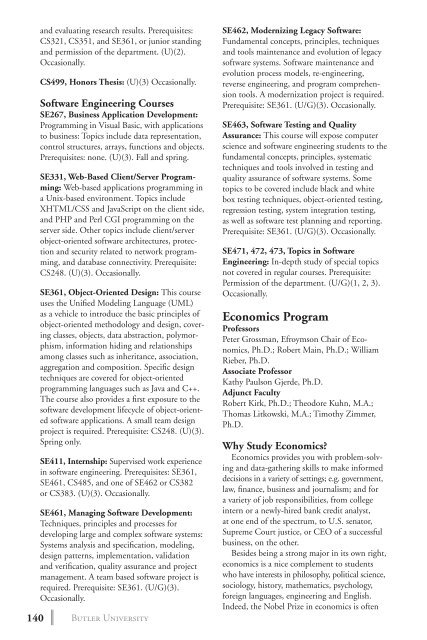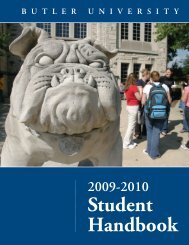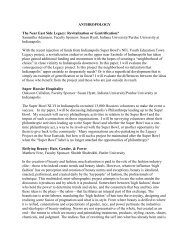2 0 1 3 bulletin - Butler University
2 0 1 3 bulletin - Butler University
2 0 1 3 bulletin - Butler University
You also want an ePaper? Increase the reach of your titles
YUMPU automatically turns print PDFs into web optimized ePapers that Google loves.
140<br />
and evaluating research results. Prerequisites:<br />
CS321, CS351, and SE361, or junior standing<br />
and permission of the department. (U)(2).<br />
Occasionally.<br />
CS499, Honors Thesis: (U)(3) Occasionally.<br />
Software Engineering Courses<br />
SE267, Business Application Development:<br />
Programming in Visual Basic, with applications<br />
to business: Topics include data representation,<br />
control structures, arrays, functions and objects.<br />
Prerequisites: none. (U)(3). Fall and spring.<br />
SE331, Web-Based Client/Server Programming:<br />
Web-based applications programming in<br />
a Unix-based environment. Topics include<br />
XHTML/CSS and JavaScript on the client side,<br />
and PHP and Perl CGI programming on the<br />
server side. Other topics include client/server<br />
object-oriented software architectures, protection<br />
and security related to network programming,<br />
and database connectivity. Prerequisite:<br />
CS248. (U)(3). Occasionally.<br />
SE361, Object-Oriented Design: This course<br />
uses the Unified Modeling Language (UML)<br />
as a vehicle to introduce the basic principles of<br />
object-oriented methodology and design, covering<br />
classes, objects, data abstraction, polymorphism,<br />
information hiding and relationships<br />
among classes such as inheritance, association,<br />
aggregation and composition. Specific design<br />
techniques are covered for object-oriented<br />
programming languages such as Java and C++.<br />
The course also provides a first exposure to the<br />
software development lifecycle of object-oriented<br />
software applications. A small team design<br />
project is required. Prerequisite: CS248. (U)(3).<br />
Spring only.<br />
SE411, Internship: Supervised work experience<br />
in software engineering. Prerequisites: SE361,<br />
SE461, CS485, and one of SE462 or CS382<br />
or CS383. (U)(3). Occasionally.<br />
SE461, Managing Software Development:<br />
Techniques, principles and processes for<br />
developing large and complex software systems:<br />
Systems analysis and specification, modeling,<br />
design patterns, implementation, validation<br />
and verification, quality assurance and project<br />
management. A team based software project is<br />
required. Prerequisite: SE361. (U/G)(3).<br />
Occasionally.<br />
<strong>Butler</strong> <strong>University</strong><br />
SE462, Modernizing Legacy Software:<br />
Fundamental concepts, principles, techniques<br />
and tools maintenance and evolution of legacy<br />
software systems. Software maintenance and<br />
evolution process models, re-engineering,<br />
reverse engineering, and program comprehension<br />
tools. A modernization project is required.<br />
Prerequisite: SE361. (U/G)(3). Occasionally.<br />
SE463, Software Testing and Quality<br />
Assurance: This course will expose computer<br />
science and software engineering students to the<br />
fundamental concepts, principles, systematic<br />
techniques and tools involved in testing and<br />
quality assurance of software systems. Some<br />
topics to be covered include black and white<br />
box testing techniques, object-oriented testing,<br />
regression testing, system integration testing,<br />
as well as software test planning and reporting.<br />
Prerequisite: SE361. (U/G)(3). Occasionally.<br />
SE471, 472, 473, Topics in Software<br />
Engineering: In-depth study of special topics<br />
not covered in regular courses. Prerequisite:<br />
Permission of the department. (U/G)(1, 2, 3).<br />
Occasionally.<br />
Economics Program<br />
Professors<br />
Peter Grossman, Efroymson Chair of Economics,<br />
Ph.D.; Robert Main, Ph.D.; William<br />
Rieber, Ph.D.<br />
Associate Professor<br />
Kathy Paulson Gjerde, Ph.D.<br />
Adjunct Faculty<br />
Robert Kirk, Ph.D.; Theodore Kuhn, M.A.;<br />
Thomas Litkowski, M.A.; Timothy Zimmer,<br />
Ph.D.<br />
Why Study Economics?<br />
Economics provides you with problem-solving<br />
and data-gathering skills to make informed<br />
decisions in a variety of settings; e.g. government,<br />
law, finance, business and journalism; and for<br />
a variety of job responsibilities, from college<br />
intern or a newly-hired bank credit analyst,<br />
at one end of the spectrum, to U.S. senator,<br />
Supreme Court justice, or CEO of a successful<br />
business, on the other.<br />
Besides being a strong major in its own right,<br />
economics is a nice complement to students<br />
who have interests in philosophy, political science,<br />
sociology, history, mathematics, psychology,<br />
foreign languages, engineering and English.<br />
Indeed, the Nobel Prize in economics is often
















